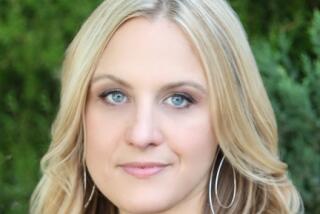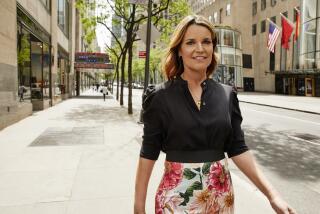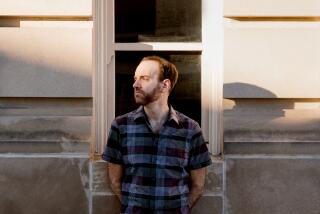Q&A: Author Scott Cheshire on his debut ‘High as the Horses’ Bridles’
Author Scott Cheshire, who recently served drinks on “Bravo’s Watch What Happens Live,” spent his youth as a minister, preaching door-to-door and giving sermons. Born and raised a Jehovah’s Witness, he was steeped in the faith’s apocalyptic visions.
The title of his debut novel, “High as the Horses’ Bridles,” comes from the Book of Revelation -- it’s how deep the blood of sinners will flow in the end times. It’s a work of fiction that wrestles with ideas of faith and fatherhood, a modern New York as well as life on its margins.
The novel follows Josiah Laudermilk, age 12, from the moment he stands before a congregation 4,000 strong and captivates them to decades later when he has left the church. He returns home to Queens to care for his father, who is slipping into a spiritually canted senility.
Cheshire, who lives in New York, chatted with us by phone about his fears while writing the novel, what he discovered in the appendices of New World Bibles and what his parents, still both practicing Jehovah’s Witnesses, think of the book.
Cheshire will be appearing at Skylight Books on Thursday at 7:30 p.m.
There are some obvious similarities between you and your protagonist Josie. How much of the novel would you consider autobiographical?
I was a child preacher, but a lot of kids were in my culture; so I definitely drew on that. The evocation of Queens was important to me because I’m from Queens. But I also wanted to write about Southern California because I had lived in Seal Beach for a few years, and I found it to be a strange, quiet and beautiful place. My time in Southern California really informed my romantic vision of Southern California.
You had a dream of a painted ceiling in the theater owned by the Jehovah’s Witnesses and began writing this novel the next day. The images of the ceiling are described in great detail throughout the book. What was it about the dream and the image of the ceiling that was so powerful?
It’s based on an actual ceiling in a theater in New Jersey. In my memory, the ceiling is that vivid. I think what struck me was that I actually did have that dream. I’m very interested in dreams — I think there’s often something present in dreams that we’re not really sure of. But it’s there, and it’s up to you to parse it and open it up.
I started writing a description of the ceiling because I was trying to figure what it was within that dream that came up in my subconscious. And as I was writing the description, it hit me that there was this really lovely but disturbing irony. We were a mixed people who were imagining a heavenly, celestial life, but doing it underneath a fake heaven.
Did the dream reveal to you that subconsciously you hadn’t completely worked out issues you had within the religion and the community as a child?
Absolutely. I feel like I should lay down on a couch right about now.
I have never written about where I came from. This is the first time I’ve actually done that. I’ve been told by writer friends and writer teachers that I needed to finally start doing that. And I think the dream partially was my own interior self telling me to do that as well.
The book, in many ways, is about a young guy trying to run away from, but also embrace, his own religious heritage. And while writing the book, that became the experience for me.
Throughout the novel, you move back and forth in time, and in and out of Josie’s perspective as a child and as an adult. Why did you make this stylistic choice?
A lot of these things tend to happen while in the writing process. The only thing I knew from the beginning that I deliberately wanted was to write a book that had a hole in it.
I was trying to write about the loss of faith. And I’m not really sure that’s something you can articulate, because it’s not a thing that actually happens like, “I lost it on a Tuesday in 1996.” The whole middle section of the book is about Josie having to find his place in the world and trying to understand the present — the now. I felt the best way to do that was for Josie to constantly circle around himself. It’s taking place now but he’s remembering what happened in the immediate past and what happened in the long past.
You began questioning your religion after reading the appendix of the New World Bible. What did you find in there that led you to question?
It’s not so much that it got me questioning; what it did was it sent me to outside sources. Despite the fact that I’m not a particularly religious person, I have a religious dent — I have this inherent desire to figure out the secretive meaning of things.
When I started reading the appendices of Bibles, they would send me to other sources, things like commentaries or apocryphal books. And those sources started putting the Bible into context and I started getting interested in the history of the book. Eventually, I started reading other books that used the Bible as a source, like “Moby Dick” or “Gilead” by Marilynne Robinson.
When you read those books, you start to see the Bible works as a book. Not to take away from any divine power that the Bible has, but I think it doesn’t have any more divine power than any other fantastic book.
Are the members of your family still practicing Jehovah’s Witnesses?
My parents are, and some of my siblings are.
I didn’t handle my leaving the church in a very mature fashion. I was a kid. It took me into my thirties to develop a mature relationship with my family. So as you can imagine, I was very nervous when I was writing this book. For years I was working on it, and I was always afraid that I would offend.
But I think in the long run, it was a good anxiety to have because it kept me on my game and forced me to make the best piece of art I could make — and not the best piece of religious criticism, or my own kind of sermon of who’s right and who’s wrong.
When my family finally did read it, which was about three months ago, my mom said she read it in two sittings and just couldn’t put it down. She told me she loved it and my dad did too — it made us closer.
They saw that I am interested in the same questions they are interested in, but that I’m just attacking those questions differently.
You’re the interview editor at the Tottenville Review. What is one question you would ask yourself if you were to interview yourself?
I can’t believe that no one’s ever asked that. I think you stumped me. The problem is that I like talking about the book.
Fear is always a great place to go. And I’m afraid of the next book. So I think I would ask myself, “how much did I spend of my own emotional life on this book, and is there anything left for another one?”
Do you have the answer to that question?
When I first met one of my teachers, Colum McCann, I was working on the book and he said, “Make sure this is something you’re obsessed with because you’re going to be working on it for five or six years.” And I said, “Don’t worry, I’m obsessed. This is all I think about.”
And now, I don’t have that obsession anymore — about anything. I guess my answer is that I have to find a new obsession.
More to Read
Sign up for our Book Club newsletter
Get the latest news, events and more from the Los Angeles Times Book Club, and help us get L.A. reading and talking.
You may occasionally receive promotional content from the Los Angeles Times.






